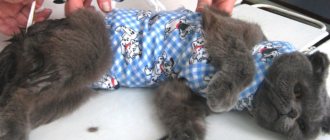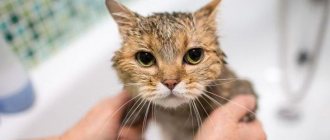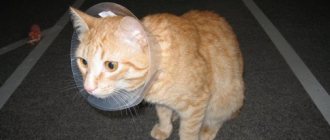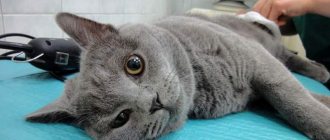About the operation itself
Two types of operation are possible:
- Castration. It involves the removal of the testes or the cessation of their functioning.
- Sterilization. With this intervention, the testes remain in the body, while they continue to work and produce hormones.
Castration can be carried out using two methods:
- Bloody methods. They involve the removal of the testes and appendages using a surgical incision. The operation is performed under general anesthesia.
- Bloodless methods. With this technique, the testes remain in the scrotum, but the vessels and nerves of the spermatic cord are destroyed. Due to impaired blood supply and innervation, the testes atrophy on their own after some time.
Sterilization in cats is also called a vasectomy. With this intervention, the testes and spermatic cord are not touched, only the vas deferens is cut, so sperm do not enter the urinary canal during ejaculation, so the cat cannot fertilize the female. However, the testes continue to produce testosterone, which is why the pet behaves as before: marks corners, demands the cat, asks to go outside.
Castration: why?
In order to avoid typical behavioral problems with an older cat, castration is performed - surgical removal of the gonad. As a result, the cat:
- Stops showing aggression;
- It becomes calmer;
- Starts to play (age does not affect activity);
- Stops leaving marks.
In most cases, castration does not cause any harm to the cat, which is why this method is popular. If the pet is completely healthy, then it quickly recovers from anesthesia. However, for some time it requires additional care.
Preparing for surgery
The preparation of any unique procedures does not require; it is enough to follow a few rules:
- The pet should not be fed 12 hours before surgery. The last meal should not be dense.
- It is not recommended to give the animal water 1-2 hours before the intervention.
- If the cat is dirty, then 3-4 hours before castration he should be washed, dried and allowed to dry.
- 2 weeks before surgery, the pet is vaccinated or given antiviral serums.
- 5. Before vaccination, deworming should be done and the animal should be rid of fleas and other blood-sucking parasites.
Special Moments
If castration was performed on a cat that is often outdoors, then you can decide to bathe for the first time after the operation no earlier than a week later. The procedure should be carried out with maximum caution. Exposure to water is also prohibited if redness, abscesses, inflammation or bleeding occurs.
During the first bathing process, after castration has been carried out, you should:
- Use a minimal amount of water;
- Avoid shampoos;
- Use warm water.
For the first time after castration, you can wash your cat using a dampened and wrung out sponge. With its help, contaminated areas are gently wiped without pressure, bypassing the operated area if possible.
During the first bath after the procedure, it is prohibited to use pet shampoo, soap, antiparasitic agents or conditioner. Washing the animal is permitted only with clean, warm water . In order to reduce fur contamination, you will need to change the cat litter more often.
Additionally, the tray is rinsed after each visit to avoid the appearance of an unpleasant odor on the fur. You will have to do the procedures every day until the veterinarian allows you to wash the cat after castration.
It will help prevent infection or bacteria from getting into the wound. The seams should be treated with brilliant green. Also, during bathing, it is forbidden to put pressure on the operated area, even if more than a week has passed since the surgical intervention, since the stitches may come apart. The wound should be protected from licking for at least 3 days - castration is a complex operation.
Thus, how long you will have to wait after castration with bathing is decided by the veterinarian. Regular brilliant green will help sterilize the wound , so taking good care of the cat’s health during this period is not difficult. It is better to wash the animal for the first time no earlier than after 2 months, in order to allow the stitches to heal, and for the pet to regain strength and forget about the stress it has experienced. The cat will quickly return to its usual rhythm of life; castration will not affect it negatively if the owner shows attention and patience.
Source
Caring for a neutered cat
After surgery, the pet becomes quiet and peaceful, does not want to go outside, and most importantly, does not mark furniture and walls in the house. The cat quickly recovers from anesthesia and begins normal life.
But you can’t relax and think that everything is fine with your pet; you should follow some care rules:
- To prevent the animal from touching the surgical suture, it is advisable to put a special protective collar on it, which will not allow the cat to lick itself. Otherwise, the animal will introduce an infection into the wound.
- Immediately after anesthesia, the pet's balance is disturbed, so it should be placed in a low place located at floor level. Place a bowl of water and a tray nearby so that the animal does not walk far.
- The wound and stitches are treated with any antiseptic (green paint, iodine) twice a day. Cotton pads are moistened with a disinfectant, after which the seams are easily blotted.
- Immediately after surgery, it is advisable to take your pet home and give it complete rest. Protect him from communication with other animals and children. If possible, you can stay at home with your pet and provide him with moral support.
- One of the important conditions when caring for an animal during the postoperative period is keeping the toilet clean. After each visit, the tray must be doused with hot water and the filler changed.
- With proper care, wound healing occurs quite quickly. As a rule, this occurs 10-14 days after surgery. But you can start water procedures no earlier than 60 days after the operation. True, an exception can be made if the pet’s wound heals without complications.
How often can you wash your cat?
We've already established that allergy sufferers have to wash their cats weekly, but what about happier like-minded people who aren't affected by the dangerous FelD1 protein?
A short-haired cat, as was said, does not need to be washed at all; it will handle hygiene itself. But there are situations when even she can’t get away from washing.
If your freedom-loving beauty “walks on her own,” her bathing will become one of the mandatory points of the program. A traveler can pick up ticks and fleas from the street (special collars do not always help), and she can get dirty while exploring the surroundings.
A researcher wandering around the area around a dacha or private home is bathed approximately every two months.
But the handsome dogs, gifted by breeders with long hair, are in a different situation. We are announcing the entire list of cats that, sadly, need to be washed.
Which cats need to be washed?
This list can hardly be called complete: the ranks of four-legged animals are replenished from time to time with new breeds (breeders are not asleep).
With regular brushing and being “under house arrest,” it is enough to bathe a long-haired kitty once every three months.
Bathing after surgery
If you urgently need to bathe a cat that has been neutered, this must be done with extreme caution. It is strictly forbidden to wash the animal 4-8 days after surgery . Subsequently, you can decide to undergo water procedures, provided that the operation was successful and no complications arose during the operation and after it. One of the important conditions is the absence of bleeding in the cat.
When bathing, you must ensure that as little water as possible gets into the area of the surgical sutures. It is preferable to wipe contaminated areas with a dampened and well-wrung out sponge. It is better not to get the area that has undergone surgery wet or touch it at all. Under no circumstances should you use soap, shampoo or any other alkaline cleaning agent during water procedures. When bathing, use only clean water.
Is it possible to wash cats with regular shampoo?
Regular shampoo means human shampoo.
It is not suitable for cats: humans and cats have different acid-base balance of the skin - our skin pH = 5.5, a cat’s pH = 7.5. Our shampoo contains a large amount of alkali.
This shampoo is too aggressive for an animal. “Human” shampoo will remove the protective layer from the cat’s skin and make the animal susceptible to infections and colds, and will also cause the pet to itch continuously.
Postoperative complications
Like people, animals tolerate surgical interventions in their bodies differently. Sometimes even a simple castration procedure can cause health complications.
- Disturbances in the functioning of the heart.
- Breathing rhythm disturbances.
- Swelling of the tongue or eyelids.
- Pallor of mucous membranes.
- Complications may include a sharp deterioration in character. The cat is nervous, bites, and does not allow contact even with its beloved owner.
Such symptoms should cause alarm to the animal owner, and the cat should be immediately taken to a veterinarian.
Bleeding may result from poor constriction of blood vessels at the wound site. Another reason is poor blood clotting as a feature of the body. You should monitor whether the cat often licks the wound, and put a protective collar on it.
What to prepare for after removal: what is considered normal, and when to urgently see a doctor
In order to prevent the development of dangerous situations after tooth extraction, you need to notice alarming signs, and even if they are mild, consult a doctor in time - this way you will avoid serious complications. This may be alveolitis, fistula, nerve damage and other pathologies. They cannot be stopped or cured at home.
In the table, we have listed the symptoms and explained in which cases they should alert you, and when the situation remains within the normal range.
What to prepare for after removal
| Symptom | Norm | Threat: You need to see a doctor |
| The gums are painful and swollen, the cheek is swollen and blue | Swelling and hematomas (bruises) are a natural reaction to injury, especially if the removal was difficult. They can intensify for up to 3 days, and then begin to subside | Does not go away for more than 4 days, gets worse or appears after sleeping - a feeling that the cheek is “blowing” |
| The wound is bleeding | Bleeding stops within the first hour after surgery. Further minor and rare discharge is possible | If the blood flows heavily for several hours or bleeding starts again at home - it is the abundance of discharge that should alert you |
| Presence of a blood globule in the socket | A dark red clot begins to form immediately after removal, fills the entire hole, and persists for up to 5-7 days | The hole is empty, “dry”, deep, a yellowish-grayish coating has appeared, there is an unpleasant putrefactive smell - this situation is called a “dry hole” |
| A white coating appeared on the wound | A whitish film appears on days 2-3 - this is the release of fibrin (a protein involved in tissue healing) | Yellow, greenish or dark gray color, as well as bad odor, redness and pain indicate the development of an infection |
| Discharge from the socket | Ichor is a clear liquid that can ooze from the wound in the first day | Cloudy pus with a putrid odor indicates an infectious process |
| The temperature has risen | Within two days (usually in the late afternoon) body temperature can rise to 38-39⁰С | The fever is severe, the temperature stays above 38⁰C for more than 2 days in a row or rises again after the condition has returned to normal |
| It is impossible to open your mouth wide, there is jaw clicking | It mainly happens after the removal of large teeth – molars, wisdom teeth. Symptoms may persist for up to 3 days (for complex operations - up to 7 days), then gradually subside | Difficulty opening the mouth persists for longer than 4 days, there are no positive changes, the pain intensifies |
| Pain at the site of the extracted tooth | Aching or pulsating - may be on days 1-3, but fades away every day | Lasts longer than 3 days or intensifies every day, spreads across the face, extends to the ear, neck |
| Part of the gum and cheek are numb | Normal for several hours after surgery - anesthesia continues to work | If the tissues have lost sensitivity for more than a day, the nerves may have been affected. Need to see a doctor |
| Running nose | Not the norm! Pain when blowing your nose and breathing, liquid discharge and runny nose are a symptom of complications during surgery | |
At what age can kittens be washed?
Mother cat monitors the cleanliness of her babies, devoting almost all her free time from sleep to this activity. At about two months of age, kittens set out on an independent life with new owners.
They begin to bathe a kitten no earlier than three or four months of age (after the change of milk teeth). By this time, he is physically stronger and can withstand temperature changes.
Early bathing is also beneficial in terms of accustoming the animal to water. The kitten will accept its fate and decide that this is an obligatory part of its existence.
Why do kittens and cats constantly lick their genitals?
If you notice that a cat or kitten often licks its testes, you need to think about it and find out the possible reasons for this behavior. Undoubtedly, males lick their genitals for hygiene, for example, after visiting the litter box or performing natural needs.
But if cats lick eggs frequently and intensely, among the possible reasons that are worth paying attention to are:
- chronic cystitis, urethritis;
- inflammation in the genitourinary tract;
- pathologies, kidney diseases;
- violation of the feeding regime, combination of natural food with dry, canned food;
- ICD, presence of kidney stones;
- neoplasms in the organs of the excretory tract;
- inflammation of the paraanal glands.
In males, excessive licking of the perineum can be caused by inflammation of the prepuce. Preputial lubrication is located in the folds of the skin. Covers the penis. In healthy males, a small amount of whitish-yellow smegma accumulates around the preputial opening, which is normal. With inflammation, bloody substances and pus can be seen in the secretion.
A cat constantly wants to lick eggs in case of acute cystitis, other pathologies in the organs of the urinary system, as well as after castration.
Urogenital pathologies
There are the following diseases of the genitourinary organs, in which the cat intensively licks under the tail:
- cystitis;
- urolithiasis disease;
- endometritis and pyometra
Cystitis
Cystitis Inflammation of the bladder due to hypothermia, unbalanced nutrition, infection of the genitals and urinary tract.
In addition to licking, it manifests itself with the following symptoms:
- urine first turns yellow, then becomes brown and foul-smelling;
- emptying of the bladder becomes more frequent, little fluid is released;
- the cat meows pitifully;
- leaves puddles everywhere.
Treatment consists of drinking plenty of fluids, fasting, rest and comfort. The veterinarian prescribes antimicrobial, immunomodulatory, and painkillers. In acute cases, the drug Stop-cystitis is prescribed. If the disease has reached a chronic stage, the herbal medicine Cat Erwin is used to relieve complications.
Prevention consists of proper nutrition, regular vaccinations, deworming, prevention of drafts and hypothermia
Urolithiasis disease
The disease is manifested by precipitation of urinary salts and injury to the urethra and ureters. The main reason is an unbalanced diet. Neutered men suffer most often. Pets that are overweight and do not exercise much are predisposed to the disease.
Clinical symptoms resemble cystitis, however, vomiting, refusal to feed, and convulsions are added. When the lumen of the urethra is blocked by stones, anuria develops, in which urine is not excreted. Acute attacks are relieved in a clinical setting. Conservative treatment and prevention include diet therapy. Veterinary feed is used.
Endometritis and pyometra
Inflammation of the uterine mucosa occurs as a result of pathological lambing or false pregnancy. A special role in the development of the disease is played by the uncontrolled use of hormonal contraceptives to disrupt estrus and unwanted pregnancy.
If conservative treatment is untimely or unsuccessful, the cervix closes and pyometra develops, a life-threatening condition. The optimal treatment is castration.
Be sure to read:
What to do if your cat has bald spots on its fur?
Elimination methods
Regardless of the type of wound infection, be it cases when a cat licks a wound or bacterial contamination of the postoperative area, it is necessary to show the animal to a veterinarian as soon as possible. If you don’t waste time and “catch” the disease at an early stage, it is quite possible to cope with it by prescribing your pet a course of antibiotic therapy. Unfortunately, in cases where the wound is severely inflamed and signs of a necrotic process are observed , a repeat operation is necessary , during which the dead tissue is surgically removed, and the wound channel is completely cleaned and sanitized of exudate.
Be that as it may, in such situations it will take at least two weeks for the cat to fully recover, and during this time the pet requires daily care.











